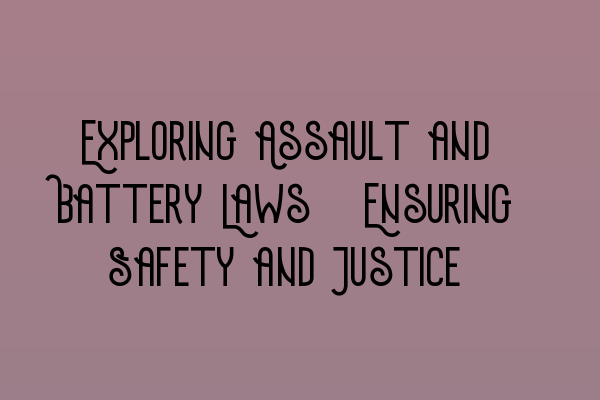Exploring Assault and Battery Laws: Ensuring Safety and Justice
Assault and battery are two terms often used together, but they have distinct meanings and legal implications. Understanding these laws is essential for individuals seeking safety and justice in cases of personal harm or violence.
What is Assault?
Assault, in legal terms, refers to the act of intentionally causing apprehension or fear of harmful or offensive contact. It doesn’t necessarily involve physical contact but rather the threat or attempt to cause harm. Assault can be verbal, physical, or even through non-verbal cues that make the victim feel threatened.
There are different degrees of assault, and the severity of punishment varies accordingly. In SQE 1 Practice Exam Questions, you can test your knowledge on different scenarios and understand the specific elements of assault that need to be proven for a successful prosecution.
What is Battery?
Battery, on the other hand, involves the intentional and unlawful application of force onto another person. Unlike assault, battery requires actual physical contact or harmful touching. It may include acts like punching, kicking, or any other offensive physical contact that causes harm or injury to the victim.
It’s important to note that battery can occur even if there was no prior assault. SQE 1 Practice Mocks FLK1 FLK2 provide simulated scenarios for you to assess your understanding of battery charges and their implications in criminal cases.
Distinction between Assault and Battery
Although assault and battery are commonly used together, it is crucial to differentiate between the two. Assault refers to the threat or fear of harm, while battery involves actual physical contact or harmful touching. However, in some jurisdictions, the terms might be used interchangeably, so it’s essential to consult specific regional laws.
For a detailed understanding of both assault and battery, SQE 2 Preparation Courses offer comprehensive modules that cover various legal aspects and provide practical insights into these criminal offenses.
Penalties for Assault and Battery
The severity of penalties for assault and battery can vary depending on the jurisdiction and the specific circumstances of the case. Aggravating factors, such as the use of a weapon or inflicting serious bodily harm, can lead to enhanced punishments.
It’s crucial for victims of assault or battery to seek legal assistance to ensure their rights are protected and that justice is served. SQE 1 Preparation Courses provide comprehensive guidance on criminal law, equipping aspiring attorneys with the skills necessary to advocate and support those affected by these offenses.
SQE Exam Dates for Criminal Law
If you’re pursuing a legal career in criminal law, it’s important to stay updated on the upcoming SRA SQE Exam Dates. These exams serve as a gateway to becoming a qualified solicitor, and proper preparation is crucial for success. Stay ahead of your study schedule by referring to the list of exam dates provided.
In summary, understanding the distinction between assault and battery is vital for ensuring safety and justice for victims. By familiarizing yourself with the legal elements and penalties associated with these offenses, you can make informed decisions and seek appropriate legal recourse.
For more comprehensive knowledge and interactive learning, explore the related articles below:
- SQE 1 Practice Exam Questions
- SQE 1 Practice Mocks FLK1 FLK2
- SQE 2 Preparation Courses
- SQE 1 Preparation Courses
- SRA SQE Exam Dates
